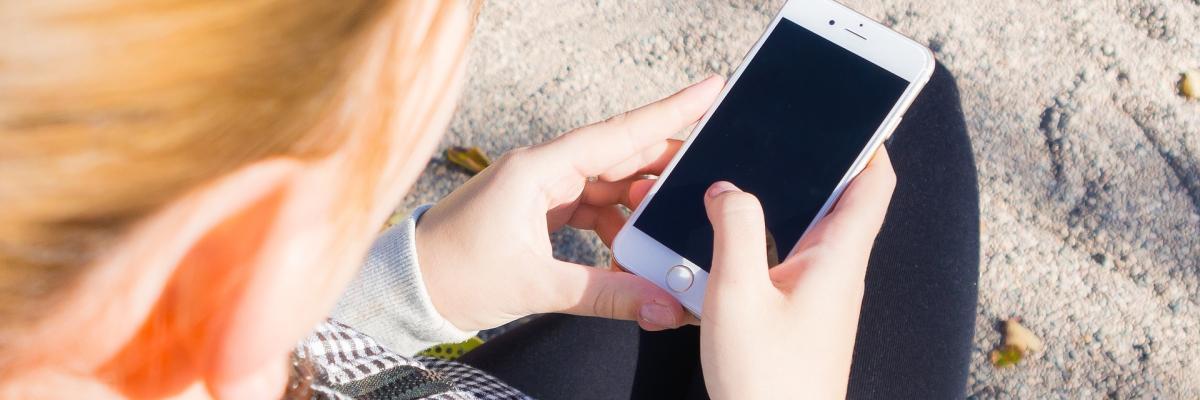In this guest post, Dr Autumn Roesch-Marsh, Senior Lecturer in Social Work at the University of Edinburgh, shares learning from a research project exploring mental health, social media and care experience.
Most of us use the digital world to stay connected to friends and family, to learn, to shop, to play and have fun. The pandemic has only accelerated our use of digital devices and online platforms. In this blog I will share some of the learning from the research project I have just completed, which explores mental health, social media and care experience. I hope a few of the insights I share here will be of use to practitioners or other researchers in their work with care experienced young people.
The research project started before the pandemic, and like many things, it was delayed by the pandemic. However, as concerns about mental health have grown during lockdown, the pandemic also made the topic more relevant.
The aim of the project was to better understand how young people with care experience use social media and how this impacts on their mental health and relationships. Very few people have researched this topic so our study was exploratory, we didn’t think we would find all the answers, but we hoped to find out more about what young people, foster carers, residential workers and throughcare workers thought about this topic. You can read the full research findings on the eNurture website. The film we made with care experienced young people and The Articulate Trust is also available via the eNurture website.
Here I want to focus on two key aspects of the project which I think are very important for social work practice. Some of what I will say is drawn from our own findings and some relates to other things I have read and learned. I have put a list of references at the end so that you can read more if you are interested.
The first key learning is about how digital rights can support the mental health of young people with care experience. On the 4 February 2020, the UN committee on the Rights of the Child adopted General Comment 25 in relation to digital rights in the online world. When we asked care leavers about what mental health meant to them they talk about having friends, having fun things to do, having enough money, being respected and included, feeling understood and being cared for. They shared with us how being online can be crucial to ensuring they have all these things. Without WiFi or a reliable device they cannot chat to their friends or family and it is much harder to maintain their connections. When they are without their phones they feel anxious and worried because they cannot connect, a finding that is further supported by some other work we did on digital inclusion during the pandemic.
This is not because they are shallow and silly, as they are sometimes depicted to be, this is because they want to be connected to the people that matter to them. This helps them know who they are and feel acknowledged. Being online also allows them to give and receive support. So, one of the key findings of our work is that being able to connect online is a key tool for connection and support, and therefore, vital for mental health. And yes, online conversations and comments can get nasty and hurtful, just like those offline, but this is just what the messy world of human relationships is like.
Young people also told us that boredom was bad for their mental health. When they were bored they said they thought about sad things and worries more. Being online to watch funny videos, play games or chat gave them something to do. It helped them relax and unwind, which was good for their mental health. And yes, sometimes they saw horrible content that made them feel disgusted or worried, but they could report this or block this – it wasn’t the end of the world. They said they appreciated it when adults took a respectful interest in what they were enjoying online and tried to understand what was important in their digital world. Adults who just focused on the risks or regulating their use were frustrating and annoying and not very much help when things went wrong.
Young people told us they needed their phones to connect to the wider world and do important things like look for jobs, training or educational opportunities and apply for benefits or other help and support. In this way, the digital world was an access point to many of the things that we know support mental health, including meaningful activity, enough money, and access to more specialist support when required. Our research suggests social workers need to think about access to the digital world as a core need and as a way of ensuring a range of other needs are met.
Building on the work of this project I am working with AFA Scotland to secure funding for future training for foster carers. I will also be working with Who Cares? Scotland on an exciting new digital rights and digital access research project. Please keep an eye on their website for updates.
Further reading
- Betton V and Woollard J (2019) Teen mental health in an online world. London: Jessica Kingsley
- Children’s Commissioner for England (2017) Growing up digital in care. Submission to the DfE Fostering Stocktake, 2017. London
- Firth E (2017) Social media and children’s mental health: a review of the evidence. London: Education Policy Institute.
- Goodyear VA. and Armour KM (eds.) (2019) Young people, social media and health. London: Routledge.
- Livingstone S and Haddon L (2009) (eds.) Kids online: opportunities and risks for children. Bristol: The Policy Press, 272.
- Livingstone S and Blum-Ross A (2020) Parenting for a digital future. London: Oxford.
- McGhee K and Roesch-Marsh A (2020) Bridging the digital divide for care experienced young people: If not now, when? Glasgow: CELCIS.
- Roesch-Marsh A (2020) Digital exclusion and care leavers: It's time for social work to join this fight. Social Work 2020 under Covid-19 Magazine.
- Roesch-Marsh A and Emond R (2021) Care experience and friendship: theory and international evidence to improve practice and future research. The British Journal of Social Work, 51, 1, 132-149
- Roesch-Marsh A, McGhee K and Gillon F (2021) The digital divide; the impact on the rights of care leavers in Scotland. Glasgow: CELCIS.
- Ross S and Edmonds R (2018) Social media, young people and mental health (Briefing no 53) Centre for Mental Health
- Third A, Bellerose D, Dawkins, U et al (2014) Children’s rights in the digital age: a download from children around the world. UNICEF
About the author
Autumn is a qualified social worker with a passion for social work education and working with children and their families. She is a Senior Fellow of the Higher Education Academy and teaches across postgraduate and undergraduate courses.
She has a keen interest in practice and research informed teaching that is experiential and she is interested in developing scholarship in the area of learning and teaching. Her teaching interests include child and family social work, community social work, and social work skills and values.
Contact via Twitter: @DrARoeschMarsh


